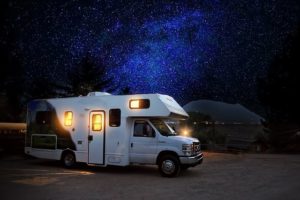With the pandemic limiting travel choices and canceling vacation plans across the country, many Americans are turning to new means of transportation. Sales and rentals of campers and RVs have been spiking during COVID-19 as people do their best to avoid planes, trains, and buses. Even as the vaccine rolls out across the country, these enclosed spaces remain high-risk areas.

Campers and RVs can be a great option for a pandemic vacation. They allow you and your family to travel great distances with maximum comfort and minimum exposure to any other people. But these large vehicles come with their own risks and dangers, particularly for renters or new owners not familiar with the vehicles.
If you’re taking to the road in an RV or camper, keep the following safety tips in mind:
1. Always Be Aware of Your Surroundings
RVs are bulky, unwieldy vehicles. They are designed to maximize the interior space available to the occupants, and therefore often have sharp corners or bulky protrusions that reduce visibility. RVs should always be operated with extreme caution, particularly by inexperienced drivers.
2. Track the Weather
RVs offer many advantages to campers, but they generally aren’t designed for serious off-road travel. A gravel road or packed dirt trail could quickly become impassable to an RV after only a light rain. Anytime you take your camper off the paved asphalt, be completely aware of any potentially hazardous conditions that could limit your ability to get back.

3. Stay Connected
Always make sure you have a way to call for help. The pursuit of adventure can lead RV owners off the beaten path, and if you get in trouble it is absolutely vital that you be able to alert someone to the situation. What constitutes appropriate communications gear will vary with the circumstances, but be wary of areas where a simple cell phone may not be enough.
4. Track Pedestrians
RVs are versatile vacation vehicles. This means they are often parked in close proximity to large gatherings, playing children, or heavy foot traffic. Pedestrians may be too comfortable around an RV, erroneously assuming that it is parked for a long-term stay and not expecting it to move. Any time you move your RV, particularly if it has been in the same spot for a long time or if there are people nearby, it is a good idea to have a “spotter” outside the vehicle checking blind spots and warning pedestrians.
Even if you haven’t joined the mobile home trend, you’ll be encountering them on the road more and more frequently. Always keep in mind that the person driving a camper may have limited experience with large vehicles, and stay safe by staying vigilant and aware.
Vehicle crashes involving RVs often create tricky issues involving ownership and insurance. If you or someone you love has been injured in a collision involving an RV, the attorneys at Allen & Allen have experience with these types of crashes. Call us today for a free consultation at 866-388-1307.


